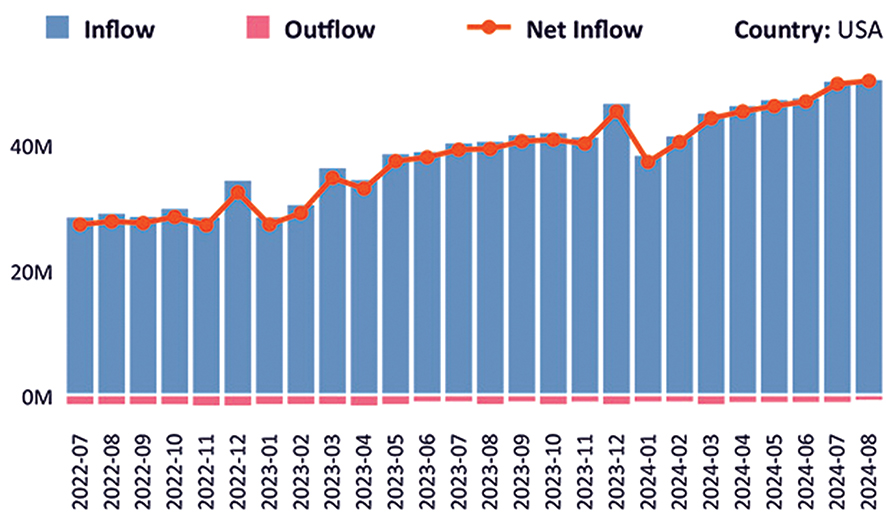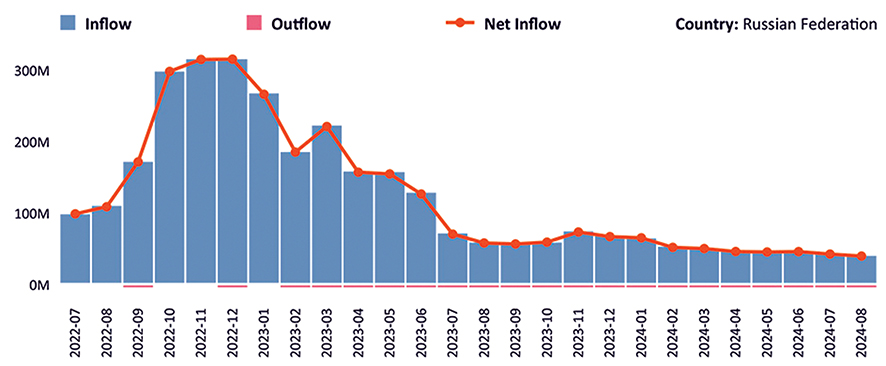By Sally White for Investor.ge
Remittances, a boon for household budgets, family businesses and government coffers, have dropped from the $3 billion high registered in 2021-22. However, the overall decrease hides a new trend of higher numbers coming from high-wage economies in the West, underscoring the number of Georgians leaving for jobs abroad.
The latest National Bank of Georgia (NBG) numbers show a total for July of $283 million, down 1.3 percent on a year ago, largely due to a drop in transfers from Russia, Ukraine, and Belarus. The inflow of bank transfers from those countries peaked in the months following Russia’s 2022 invasion of Ukraine, and have since dropped, although they remain higher than before the invasion.
For the Georgian labor market, the figures indicate a new, and perhaps troubling, trend: inflows from several countries—including the US, up 16.9 percent annually at $50.3 million and the largest contributor in the month, and Italy, up 6.6 percent at $48.9 million—are climbing.
Other chunky sources of inflows in July were Germany (at $24.7 million, up 18 percent), Greece ($23.2 million, up six percent), and Israel ($21.7, up seven percent).
The bump in remittances from these countries reflects the growing number of working age Georgians leaving the country since 2022.
‘A country of emigration’
The Organization of Economic Corporation and Development (OECD) classifies Georgia as a “country of emigration.” Well over half – 58 percent – of Georgians have immediate relatives living abroad, according to a Caucasus Barometer survey carried out this spring. Data released by the National Statistics Office of Georgia show that total migration from Georgia increased by 96 percent last year, with 245,000 people leaving the country. The great majority of them were of working age, and half were Georgian citizens. The remainder was largely made up of Russian, Turkish, Ukrainian and Belarusian citizens.
The size of the Georgian population now is largely guesstimate. The last population census was taken some years ago (2019), and until the next census (scheduled for November this year) is published, it is uncertain exactly how many of the then 3.72 million people remain, or their ethnicity. A previous census, conducted in 2014, also showed 3.7 million people, but Georgia is shrinking: the population numbered 4.4 million in 2002, down from 4.8 million in 1994. A 2022 study by Georgian consultants PMC Research stated that, since 2010, nearly a quarter of the Georgian population had moved abroad for work. The EU states that over half of those leaving are women.
Underlining the importance of these money inflows to the Georgian economy, the PMC Research study says that “over the last decade, Georgia’s economic dependence on remittances increased notably. From 2013 to 2022, the percentage of remittance inflows as a share of GDP grew from 11 to 16 percent.” Of course, the latter number was boosted by the inflow from Russia, Ukraine and Belarus, but remittances have always been an important component. The World Bank gives the historic share of remittances in Georgia’s GDP between 1997 and 2023, at an average of around 10 percent.
Some have blamed the exodus of workers on the ease with which Georgians can travel to Europe, where entry does not require a visa. Money transfers from the EU have shot up considerably since 2017, when the visa-free regime for Georgian citizens was introduced. Italy, where carers for the elderly are in high demand, is an increasingly popular destination for women. However, the EU visa regime is supposed to be used for visits, not for prolonged stays, and work permits are limited and require separate, country-based, applications. So, many of the Georgians in the EU are working illegally, notes PMC Research, although in most industries they are welcome, as labor shortages are acute, especially in just about all aspects of construction and services.

Georgians taking the risky and costly option of entering the US, joining the influx crossing over the Mexican border, have also excited media comments, even though there are no firm numbers. While Russia continues to host the most Georgians (113,000 ethnic Georgians according to the 2021 Russian census, although Georgian diaspora organizations claim up to a million live and work there), it is no longer the most favored destination.
News in recent weeks shows why Russia is falling from favor, despite a RIA Novosti report of a 35 percent rise in construction workers’ salaries in H1 2024 as labor shortages bite. Online news source Havli is reporting spiraling anti-migrant sentiments across Russia, despite thousands of jobs vacancies. A factor, too, is that Russian policy is conflicted as, despite a labor crisis, foreigners are banned from working in many sectors of the economy.
Seeking higher wages
A look at the average monthly wages of the countries to which Georgians are moving, published in TBC Capital’s Macroeconomic Outlook for 2024, show another facet of the story—the US offers around $6,000 a month, Israel $4,000, Italy $2,700, Poland $2,000, and Greece $1,500, compared to the Russia average of $1,130. According to international emerging market research group, CEIC Data, the Georgian figure is $728; Enterprise Georgia’s website reports the monthly average as $410.
Not surprisingly, with the Georgian economy currently recording average real GDP growth for January-May 2024 of 9.3 percent, Georgia’s demand for labor is high. However, it remains unsatisfied, with around half of the companies surveyed earlier this year by the Business Association of Georgia (BAG) indicating that labor shortages were a hindering factor to business. Despite this fact, the IMF notes in its May report on Georgia that wages grew by 17.3 percent in 2022 and 16.8 percent in 2023.
A 2023 EU study, Socioeconomic Stability for Georgian Labor Migrant Women, states: “…the rising need for domestic labor in the international job market drives women’s labor migration from Georgia, a phenomenon shaped by socioeconomic challenges. If unemployment and low wages are the major reasons for migrating, structural issues, such as a weak health and social welfare system, expensive bank loans, housing challenges, and other issues contribute to the reproduction of poverty, aggravate households’ economic hardships, and thus render migration inevitable, while creating significant barriers for return and sustainable reintegration.”
Gender data for labor migration is not available, it observes, but most of the remittances by women workers come from Italy and Greece and are used to provide for the family. The EU adds: “Studies show that in the last decade, remittances constituted an important share of recipient households’ income, although the sustainable impact on the economy is questionable, since the greatest share of remittances is spent on primary needs, such as food (79 percent), utility bills (63 percent), and clothing (53 percent). Only seven percent of those receiving remittances manage to collect savings to start a business or buy fixed or unfixed assets.”

This EU study, designed to help female migrant workers return to Georgia, looks at the underlying human stories of the remittance numbers. Drawing on social research it states: “…on the one hand, a mother’s emigration improves children’s chances for material well-being and access to education, while on the other, it causes a deficiency of physical and emotional care, thus negatively affecting the processes of socialization and self-realization among the children left behind.”
The report notes that too often the women find they are trapped “after providing for children, migrant women continue their efforts in migration to provide for grandchildren.”
Georgian households receiving remittances have fluctuated in number, but PMC Research gives a proportion of 5.5 percent in 2020 and 6.6 percent in 2022. On average, it says, from 2013-2022, the amounts sent home averaged GEL 573 monthly or 41 percent of those households’ total monthly income. Households receiving remittances, it states, had an income of 1,398 GEL, 28 percent higher than those not receiving remittances. Only 38 percent of households receiving remittances had income from hired employment.
The benefits to Georgian households, as set out by PMC Research, is that remittances appear to give Georgian households income above their daily needs “enabling them to save money, acquire property and tighten their financial security.”
By Sally White for Investor.ge














